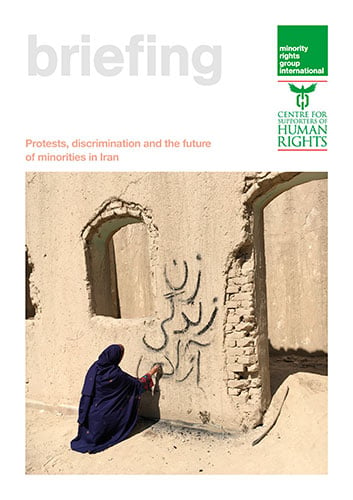
Iran: investigation into serious rights violations must continue
In Iran, minority communities face discrimination and marginalization by the Iranian authorities. These violations take place within a wider context of human rights violations, such as against women, who experience discrimination in law and in practice in essentially every area of their public and private lives. The United Nations Fact-Finding Mission on the Islamic Republic of Iran (FFMI) was created to investigate allegations of such human rights violations.
At the 58th Session of the United Nations Human Rights Council, on Tuesday 18th March 2025, Sabah Bandoui delivered the following statements on behalf of Minority Rights Group (MRG) and the Balochistan Human Rights Group (BHRG), during the Interactive dialogue with the Special Rapporteur and FFMI on the Islamic Republic of Iran.
Mister President,
Members of the Fact-Finding Mission on the Islamic Republic of Iran,
Minority Rights Group (MRG), Balochistan Human Rights Group (BHRG) greatly welcome the FFMIs landmark finding on the crimes against humanity perpetrated against minority communities as separate persecuted groups.
These conclusions, along with the FFMI roadmap for justice and equality provide long awaited validation of minority experiences of violations and atrocities in Iran and reaffirm the need for the Human Rights Council to address structural and systematic discrimination that lies at the root of these crimes.
As the FFMI has rightly outlined, the persecution of ethnic and religious minorities in the country both predate and extend well beyond the repression of the Women Life Freedom movement. We are concerned about the state’s persistent campaign to silence dissent, illustrated by the intensified pressure and surveillance of minorities, human rights defenders, lawyers, journalists and families of victims.
Ongoing impunity for perpetrators, alongside the continued persecution of activists and minorities suggests a high risk of recurrent violence. Domestic measures on accountability have thus far been insufficient or non-existent while efforts to access justice in Iran are deeply obstructed by persistent threats, intimidation and violence against victims and those acting on their behalf.
We call on the Human Rights Council to support the continuation of investigations into serious violations of human rights and atrocity crimes in Iran, with a broader mandate and temporal scope than the FFMI, to ensure comprehensive accountability and justice for the persecution of minorities and women in the country.
I thank you.
Mister President,
Minority Rights Group (MRG), Balochistan Human Rights Group (BHRG) greatly welcome the FFMI’s landmark finding on the crimes against humanity perpetrated against minority communities as separate persecuted groups.
These conclusions, along with the FFMI roadmap for justice and equality provide long awaited validation of minority experiences of violations and atrocities in Iran and reaffirm the need for the Human Rights Council to address the structural and systematic discrimination that lies at the root of these crimes.
As the FFMI has rightly outlined, the persecution of ethnic and religious minorities in the country both predate and extend well beyond the repression of the Women Life Freedom movement. We are concerned about the state’s persistent campaign to silence dissent and ongoing impunity for perpetrators, which indicates a high risk of recurrent violence. Domestic measures on accountability have thus far been insufficient while efforts to access justice in Iran are deeply obstructed by persistent threats, surveillance, intimidation and violence against victims and those acting on their behalf.
We call on the Human Rights Council to support the continuation of investigations into serious violations of human rights and atrocity crimes in Iran. Investigative mechanisms should have a broader mandate and temporal scope than the FFMI to monitor abuses and crimes against minorities beyond the September 2022 protests and ensure comprehensive accountability and justice for the persecution of minorities and women in the country.
I thank you.
Featured image: A Baloch woman writes ‘Women, Life, Freedom’, the slogan originating in Kurdish grassroots movements and adopted by protestors across Iran, on a wall in Sistan-Baluchestan, Iran, 2022. Credit: Anonymous.




